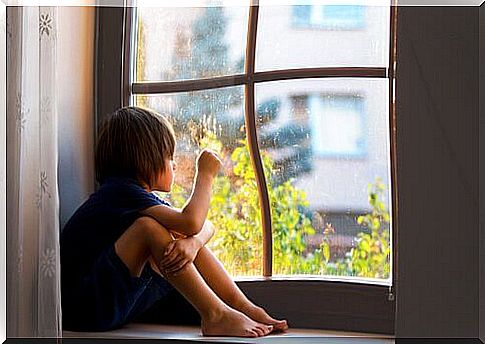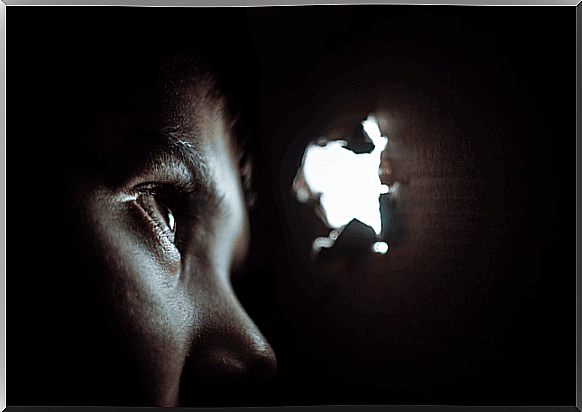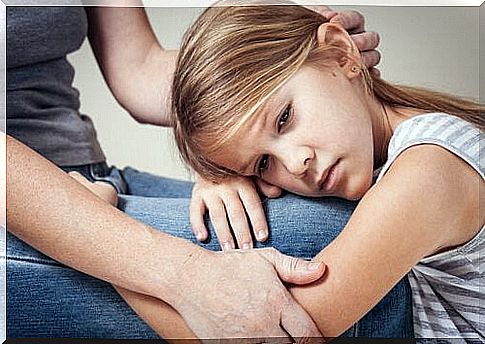Separation Anxiety: Why Attachment Is Good For Children

Separation anxiety can be experienced by any child, and it has the ability to strongly shape their everyday lives. We can all imagine the problems that create anxiety in adults, right? Not only for our mental health, but also on the physical plane.
And we probably all agree that a child has much less ability to regulate his emotions. Unfortunately, the truth is that children can get caught up in ordinary emotional states that make their childhood a sad time. But the exact opposite also exists within them.
One of the truths that children need to learn is that the people who are important to them do not abandon them when they leave.
Separation anxiety comes from the fear children feel when they are separated from their parents or the people they are most attached to. It is normal for these feelings to appear in young children at an early age, but it is also normal for them to disappear fairly quickly.
And this happens because when they see their parents go their way and come back, they begin to normalize the separation. They no longer experience it as abandonment, just a temporary absence. So when does it become a problem?

This anxiety is harmful when it is very intense or when the separation is not normalized. Eventually, it can develop into a pathological condition: separation anxiety disorder.
Diagnostic criteria for separation anxiety
To be diagnosed, the child must show signs of at least three of these symptoms:
- Excessive and chronic discomfort when they suspect or experience a separation from their home or the people to whom it is most attached.
- Constant resistance to or refusal to sleep away from home, or to sleep without being close to someone to whom it is very attached.
- Excessive and constant worry about the possibility of losing the people to whom it is most attached or that something could happen to these people, such as illness, injury, natural disaster or death.
- Excessive and constant concern about the possibility that something would separate them from a person they are attached to. (Like getting lost, kidnapped, unhappy, or sick.)
- Constant resistance to or refusal to go out, whether it is far from home, to school, work or any other place, for fear of separation.
- Excessive and constant fear or resistance to being alone or without the people they are most attached to, at home or elsewhere.
- Recurring nightmares about separation.
- Recurring complaints about physical symptoms when they experience or suspect a separation. Examples are headache, stomach pain, nausea and vomiting.
In addition to this, the fear and avoidance must be constant and have lasted for four or more weeks. And that’s how our children’s lives are greatly affected.
This results in great discomfort for the children who experience it. Actually, it is not just the children who suffer. It is also the adults who have to witness their child’s suffering every time they leave them.

Separation anxiety can cause social isolation, deterioration of study results and other psychological and emotional problems. But that’s not all.
They have also found that it can cause sleep problems, as well as create conflicts between family members. Therefore, it is important to know the factors that play a role in a child getting stuck in separation anxiety.
To begin with , it is harmful for children to be constantly with their parents. This does not mean that parents should not spend time with their children. This means, however, that there must be times when the child and the child’s parents are not together. Why?
Because if there have been no occasions of short separations, they will not be used to it. And then they will probably overreact when the separation is inevitable.
To put it another way, this habit of “getting stuck” in separation anxiety we talked about will only happen if the child has many opportunities to get caught up in it. It is usually best to start with shorter periods of absence and then extend them as you go along.
Unexpected or traumatic situations can also cause the child anxiety or cause them to regress emotionally. For example, going to school, having to visit the hospital or the death of a family member.
How parents can help
There are also some parents who reinforce their children’s addictive behavior by bringing even more anxiety to the situation. We are talking about children today, but there are also many parents with separation anxiety who infect their children with it.

Therefore, children will not be able to become so independent. They are likely to rely too much on parental contact and protection. Therefore , it is important that the people to whom they are connected encourage independence a little at a time.
If you can do that, you will do your part to ensure that your children are not overwhelmed by anxiety when you temporarily leave their side.
Photos courtesy of Chinh Le Duc, Dmitry Ratushny and Viktor Jakovlev.









